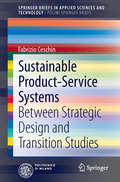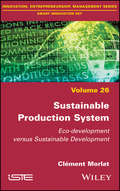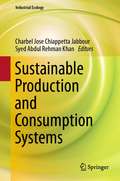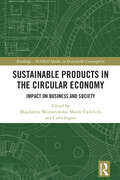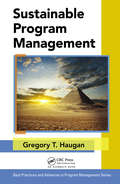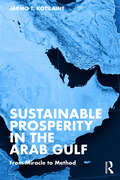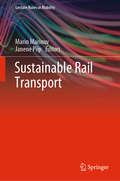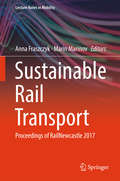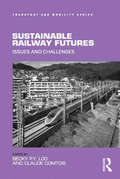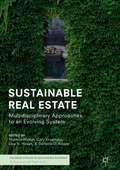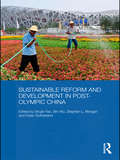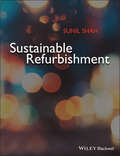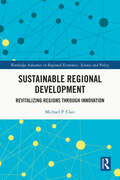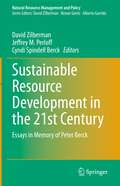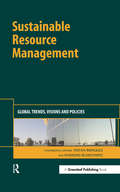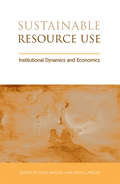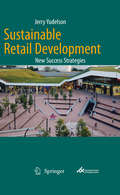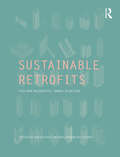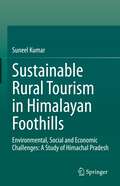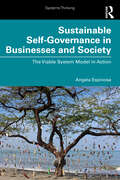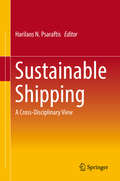- Table View
- List View
Sustainable Product Management at Solvay
by George Serafeim Vincent Dessain Mette Fuglsang HjortshoejIn November 2019, Ilham Kadri, CEO of Solvay, a Belgian specialty chemicals and advanced materials group, with annual revenues of more than 10 billion in 2018, announced the group's mid-term strategy, eight months after she took the helm as Solvay's 11th CEO. The case describes what options Solvay had to operate a business transformation to follow a growth path while aiming to be a leading environmental solutions company. Solvay had developed a sustainability tool called Sustainability Product Management to identify promising business applications. How effective was the tool? What business lines should Solvay promote to grow and at the same time be more sustainable?
Sustainable Product Platforms: Using Nature's Rules to Design a Platform That Will Maximize Your Returns from Sustainability
by Gregory C. UnruhCan you leverage a simplified materials palette, and renewable energy and value cycle to transform your entire industry? The answer is determined by your ability to exploit nature's platform approach. Just as the biosphere uses DNA to improve upon the accumulated wisdom of evolutionary experiments, you can use a small number of materials and processes to create not just a single sustainable product, but a variety of products in a process of constant, albeit gradual, innovation and change. If you've already built your business around an economically viable value cycle (instead of the traditional value chain), founded on a non-toxic, economical materials palette and energy-efficient process technology, you are on your way to optimizing your value cycle, but your work still isn't done. By leveraging your company's value cycle as a platform for creating new products and attacking fresh markets, your business can amplify the returns from sustainability and build durable competitive advantage. This chapter will provide you with the tools you need to structure and design a value cycle platform, incorporate business partners into new processes, retain platform ownership, and other important strategic considerations. This chapter was originally published as Chapter 4 of "Earth, Inc.: Using Nature's Rules to Build Sustainable Profits."
Sustainable Product-Service Systems
by Fabrizio CeschinThis book investigates the potential contribution that a strategic design approach can make to stimulating and supporting the societal embedding of sustainable PSSs (product-service systems). A new strategic design role thus emerges; a role in which the ideation and development of sustainable PSS concepts is coupled with the designing of appropriate transition paths (sequence of socio-technical experiments) to gradually incubate, introduce and diffuse these concepts. The book also outlines the new design approach and capabilities needed by strategic designers, project managers and consultants to operate at such a strategic level. On a more operational point of view, the work presents a practical "how to do" design process and associated guidelines to support practitioners in designing and managing the societal embedding process of sustainable PSS innovations.
Sustainable Production System: Eco-development versus Sustainable Development
by Clément MorlatWealth is no longer just an ability to live well in a world shaped by human activities. It is also an ability to push back or defer the limits of a world in biological and climatic closure. This book examines the theoretical conflicts and the power plays which often oppose the socio-political and technical-financial practices of recognition of what intervenes in the production of this wealth – i.e. of what has value. It lays down the principles of a contributory modeling method, allowing debates around the concept of development; the building of scenarios; the negotiation of their implementation; and a cross-sectoral reading of their social, ecological and economic costs. This method, called Dynamic Modeling of Cost Systems, is based on a territorial communication device which articulates political, contractual and accounting innovations using deliberative and normative digital tools. It combines different local representations of value, in order to approach wealth through an integrated analysis of micro-, meso- and macro- issues.
Sustainable Production and Consumption Systems (Industrial Ecology)
by Syed Abdul Rehman Khan Charbel Jose Chiappetta JabbourThis book opens up a critical dimension to the field of industrial ecology. The book discusses the post COVID-19 trends in the field of industrial ecology and evolving practices adopted by firms for betterment of environment and society. The authors identify valuable lessons to be learned and present conceptual frameworks to guide future industrial ecology applications. Transforming industrial systems into closed-loop industrial ecosystems dramatically reduces the negative impact of industrial activities on the environment. Therefore, this book is important not only for operation management scholars but also those who are interested in ensuring an environmentally sustainable future.
Sustainable Products in the Circular Economy: Impact on Business and Society (Routledge-SCORAI Studies in Sustainable Consumption)
by Marek Ćwiklicki Magdalena Wojnarowska Carlo IngraoThis book explores how the circular economy influences product design in today’s business and society. Drawing on contributions from a wide range of expert thinkers, this volume assesses the existing approaches, strategies and tools which facilitate socially and environmentally responsible production and consumption systems. It then goes on to highlight the ways in which the circular economy conceptual framework could be implemented effectively at both micro (product policy) and macro (sustainable consumption) levels in order to alter the industrial landscape and increase its interconnectedness with materials and scarce resources. Highlighting the pros and cons of transitioning to this new model, the book also cautions that it will only be made possible via significant behavior change at both industry and consumer levels. Sustainable Products in the Circular Economy will be of great interest to students and scholars of sustainable manufacturing, sustainable consumption, corporate social responsibility and business ethics. It will also be relevant to industry professionals whose work dovetails with these areas.
Sustainable Program Management (Best Practices in Portfolio, Program, and Project Management)
by Gregory T HauganThe world is undergoing major transitions due to changes in three driving forces-population, climate, and energy resources-making it essential for us to achieve sustainability in the implementation of projects and programs as well as our everyday life. This book provides essential information on the three major driving forces of the coming decades and presents options to assist us in moving toward a sustainable future. It uses a format that makes it easy to understand and apply to medium and long-range planning.
Sustainable Prosperity in the Arab Gulf: From Miracle to Method
by Jarmo T. KotilaineTracing the development journey of the Arabian Gulf region with a forward-looking perspective, this book describes how a combination of good fortune, creative experimentation, and determination has enabled the region to achieve prosperity. Today, the Arabian Gulf is well positioned to assume a pivotal role in the new global order. Forced to balance an extreme climate and acute resource constraints, but also an exceptional location, the region’s progress and prosperity have historically been precarious and vulnerable to external shocks. Efforts to transcend resource dependency have typically involved proactive attempts to enable other economic activities. This book argues that, while conventional economic diversification is making headway, the Gulf region is in fact amidst a far more holistic transformation that positions it for a pivotal role in the emerging multipolar global order. It now offers globally competitive regulations and world-class infrastructure at the heart of the Old World, flanked by two fast-growing continents. It has become the hub of choice for a growing share of inter-continental flows of people, trade, and capital, and has established strong economic ties in all directions. This book shows how, despite many risks and challenges, the region possesses the forward-looking vision and necessary resilience that can finally liberate it from its long-standing "resource curse" and a development paradigm that looks likely to provide the foundation for sustained well-being in the decades ahead. The scope and rigor of the book make it suitable as a reference on the Arabian Gulf and for those interested in global affairs and economic development, as well as policymakers and the business community.
Sustainable Rail Transport: Proceedings Of Railnewcastle 2017 (Lecture Notes in Mobility)
by Marin Marinov Janene PiipThis volume presents a collection of rail orientated research articles, covering a variety of topics on rail operations research and management of rail systems as well as innovation, particularly focusing on sustainability aspects. The material consists of the most recent research work of the authors. The authorship is international, which makes it an interesting read for rail academics and professionals around the world. Although the material has a rail research focus the material is also excellent for preparation and delivery of rail, transport and logistics orientated courses and programmes. The target audience primarily comprises research experts in transport research, but the book may also be beneficial for graduate students alike.
Sustainable Rail Transport: Proceedings of RailNewcastle 2017 (Lecture Notes in Mobility)
by Marin Marinov Anna FraszczykThese conference proceedings include a collection of articles presented at the RailExchange conference in October 2017 at Newcastle University, UK. They will be useful for researchers in developing countries looking for opportunities of knowledge exchange. The RailExchange project aimed to develop sustainable railway education in Thailand, via international partnerships and industry collaborations based around stakeholders' expertise and experiences. It involved staff exchange (academics and researchers) between Mahidol and Newcastle University for joint research and curriculum development and also organizing railway conferences and workshops in both Thailand and the UK.The papers published here focus on rail-related issues and present a perspective of a widely understood 'exchange' in academia and industry environments. 'Exchange' is perceived as rail knowledge exchange between partners, rail staff exchange between academia and/or industry, research exchange between teams, student-lecturer knowledge exchange, academia-industry collaboration, etc. In addition, more general rail-related papers are also included.
Sustainable Railway Futures: Issues and Challenges (Transport And Mobility Ser.)
by Claude Comtois Becky P.Y. LooRevitalizing railways as a major sustainable transport mode in modern societies faces many issues and challenges. This in-depth overview places the importance of railways in the wider context of comprehensive sustainability, which encompasses sustainable development, social and economic equity and community livability. Some scholars have described the 21st century as a period of renaissance for railways and suggest this transport mode can fulfil people's desire for high mobility with low negative environmental, social, economic and financial impacts. In light of these new expectations for railways, in both passenger and freight transport worldwide, this book offers the latest research insights on the renewed interest about railway expansions and their wide-ranging environmental, socio-economic and even political implications.
Sustainable Real Estate: Multidisciplinary Approaches to an Evolving System (Palgrave Studies in Sustainable Business In Association with Future Earth)
by Cary Krosinsky Thomas Walker Stéfanie D. Kibsey Lisa N. HasanThis edited collection broadens the definition of sustainable real estate based on industry trends, research, and the Paris Climate Agreements. Discussions encompass existing and new buildings throughout their life cycle, the financing of their development and operations, and their impact on the surrounding environments and communities. This broader perspective provides a better understanding of the interconnected nature of the environmental, societal, communal, political, and financial issues affecting sustainable real estate, revealing the wide-ranging impact of practitioners' decisions on the sustainable real estate system. Bringing together carefully selected articles from leading global academic and practitioner experts from urban planning, design, construction, and finance, this collection brings to light new opportunities and innovative transdisciplinary solutions to as-yet unresolved problems.
Sustainable Reform and Development in Post-Olympic China (Routledge Studies on the Chinese Economy)
by Stephen L. Morgan Bin Wu Shujie Yao Dylan SutherlandAfter thirty years of economic reform, China has reached a crossroads in its development process, and faces many challenges in the use of natural resources, the living environment, and the economic, social and political systems. The sustainability of China’s reform and development is even more salient in the face of the global financial crisis and economic recession. Taking the 2008 Olympic Games in Beijing as an iconic turning-point, the book explores key themes such as economic reform and sustainability, innovation and sustainability, globalisation and social development, and analyses the prospects for sustainable reform and development in Post-Olympic China. The book includes topics such as Chinese banking reforms; the issue of regional inequalities; energy and environmental challenges; industry development and corporate social responsibility, and democracy and media bloggers. With analysis written by experts from a wide range of disciplines, the book will appeal to a wide range of readers interested in China’s environment and sustainable development, economic and political reform, and international relations.
Sustainable Refurbishment
by Sunil ShahThis guide to green 'retro-fitting' for corporate real estate, facility managers and occupiers struggling to reduce their building's carbon footprint will help in the planning and management of a sustainable refurbishment programme.Facilities managers have a key role in improving and maintaining a building's sustainability credentials over its whole life - through benchmarking and developing improvement strategies, energy efficiency measures and installation of low carbon technologies, as well as through waste minimisation and appropriate material use.The first part of the book gives the context, providing the structure and linkage between the other chapters, together with an overview on sustainable development and refurbishment projects separately and the value gained from a sustainable refurbishment.Part 2 details the regulatory and financial drivers, together with market pressures, and provides an overview of where this is leading together with the implications for sustainable refurbishment.Part 3 provides technical support on carbon measures, helping to determine the feasibility of good practices as part of the refurbishment. Included is a review of energy efficiency, renewable and low carbon technologies and embodied carbon to enable lifecycle carbon calculations, together with the necessary behavioural change aspects needed to embed the changes. Linkages and benefits between the technologies will be highlighted.Part 4 reviews refurbishment from a wider environmental perspective, understanding the challenges and opportunities that exist for particular developments from a materials, water, biodiversity and transport perspective.Throughout the book, checklists are provided on typical activities and good practice that should be performed. These are expanded through relevant case studies and examples to show-case previous good practices and lessons learnt.The book is structured to allow a matrix approach, with Parts 3 and 4 providing the technical information necessary to deliver a sustainable refurbishment; with sector relevance and best practice with case studies throughout the book.
Sustainable Regional Development: Revitalizing Regions through Innovation (Routledge Advances in Regional Economics, Science and Policy)
by Michael P. ClairMany communities and regions are being left behind in the new economic order. The book starts with the premise that, in today’s knowledge-based economy, innovation is key, but that only seems to happen in larger urban centres. It seems that smaller centres and peripheral regions can only look forward to decline and eventual irrelevance, but this need not be the case. Wherever there are people, there is the potential to innovate. This book demonstrates that innovators are not limited to inventors and entrepreneurs. Each innovation starts with an idea that is nurtured by its creator and incubated by the larger community. The book identifies different categories of creators such that many readers will recognize themselves as being, in fact, creators. And it identifies different ways of coming up with ideas, which may validate how creators spend their time. It identifies ways to judge whether ideas should be pursued or not and looks at the steps required to turn an idea into an innovation. Many declining communities and regions around the world have resuscitated themselves by being creative and innovative — sometimes in startling ways. This book will provide some ideas to help any region reinvent itself. But having a few individuals with good ideas is not sufficient to revive a region. This book also shows how effective leaders are needed to help stimulate more creative activity and, just as importantly, to coordinate the necessary resources to turn creative ideas into innovations. The book will appeal to students, scholars and researchers of economic, regional, social and sustainable development, innovation, public policy and economic geography, as well as practitioners and policymakers concerned with regional development and regional innovation policies.
Sustainable Renovation of Buildings: Building Information Modelling (SpringerBriefs in Geography)
by Pilar Mercader-Moyano Manuel Ramos MartínThe book provides a complete vision about Spanish sustainable renovation of buildings situation at this moment, analysing legal and technological context and opportunities that economic stimulus —by means of direct aids— and the use of BIM methodologies offers a standardization of high scale interventions.Nowadays, BIM models let us integrate multiple quantitative parameters that can agile the information to interchange between stakeholders. Using this potential to standardize protocols of interventions and share knowledge is necessary to face a high scale intervention that our cities need.Climatic Emergency and socioeconomic crisis caused by recent events —COVID-19 and hydrocarbons crisis— are the two principal struggles we face as society. European Politics, embodied by National Energy and Climate Plans (NECPs) developed by each region give the way to the green transition of different productive sectors.Our building stock is responsible for approximately 36% of the CO2 emissions in the European Union. For this reason, these policies focus a large part of their efforts on economically incentivizing a new development model for the building sector that is committed to the large-scale renovation of the existing real estate stock and that, through the reduction of energy demand and of emissions, manage to reduce the environmental impact of these. Next Generation EU is the new recovery instrument that aims to mobilize investments towards strategic sectors for the reorientation of the production model that, among other measures, contributes to decarbonization through the promotion of energy efficiency and the deployment of renewable energies.
Sustainable Residential Investing: How to Make Profits with Positive Impacts from UK Property
by Anna Clare HarperFor investors from across the world, UK residential property is seen as one of the best investments available. This is for good reason. It has a track record of delivering strong, stable returns in a way that is relatively easy to understand and implement. The trouble is, the market has changed. The investors of the future value sustainability more than ever before. There is unprecedented and growing demand for Environmental Social and Governance (ESG) investing, now worth $30 trillion in Assets Under Management each year, around a quarter of all professionally managed assets. The traditional goal of profit maximisation is being replaced. Investments must increasingly be profitable as well as sustainable: economically resilient with positive ESG metrics. Yet the UK residential property market – worth over £7.5 trillion – is lagging behind. There is very little clear, easily usable guidance for those responsible for a huge proportion of the market: private investors. The positive impacts of sustainable property investing – for profit-motivated investors, people and the planet – could be huge. The financial, environmental and social costs of getting it wrong could be catastrophic. To get this right and to avoid the risks of getting it wrong, it is vital to understand: • What sustainable residential property investing is • What needs to change and • How, on a practical level, you can invest in a way that is both profitable and sustainable. This book draws on expertise from within and beyond real estate, provides a simple framework for updating your approach. It highlights common mistakes and shares advice so that you can avoid them. Ultimately, it’s about answering the question of the decade: ‘How can I invest profitably with positive impacts?’
Sustainable Resource Development in the 21st Century: Essays in Memory of Peter Berck (Natural Resource Management and Policy #57)
by David Zilberman Jeffrey M. Perloff Cyndi Spindell BerckThis is an open access book.This edited volume discusses topics in environmental economics with a focus on sustainability, conservation, and responsible resource management. Written in memory of Peter Berck, Professor of Agricultural and Resource Economics at the University of California, Berkeley, the chapters expand upon his insights about the connections between human activities and the natural world. The volume includes a selection of research on agriculture, energy, forestry, fisheries, land use, recycling, and conservation – all parts of the broad question of how natural resources can meet human needs while avoiding environmental degradation. Written from a 21st century perspective, with concerns about climate, renewable energy, biodiversity, and sustainable development, this volume will be of interest to researchers and students of agricultural and resource economics.
Sustainable Resource Management: Global Trends, Visions and Policies
by Raimund Bleischwitz Stefan BringezuSustainable Resource Management is the result of years of exhaustive research by Germany's Wuppertal Institute. Looking at material flows, industrial and societal metabolism and their implications for the economy, this important new book provides radical perspectives on how the global economy should use natural resources in intelligent ways that maximise well-being without destroying life-supporting ecosystems. It presents a vision of the future and the fundamental elements necessary for the sustainable management of the Earth's resources. It argues that the need to manage the use of our natural resources at a sustainable level can be shaped into a great opportunity for innovation and for new institutions to govern change.Sustainable Resource Management first provides an overview of the methods it has used to analyse the physical basis of our economies, from the product and firm level through to sectors and whole countries, considering material flows and life-cycle-wide impacts on the environment. Indicators are described that reflect the volume, structure and physical growth of the socio-industrial metabolism, resource productivity and the share of domestic and foreign resource use. By accounting for the global land use of different countries and regions, the book aims to better assess the global implications of domestic activities. For example, linkages are made between the consumption of food and non-food to land use change, such as the expansion of cropland at the expense of natural ecosystems.Sustainable Resource Management presents a number of key findings. Comparing the resource use of the EU with the USA, Japan and China, it determines why there is a difference. It provides evidence about the decoupling of resource use from economic growth, at the expense of an increased reliance on foreign supply. There are two closely analysed case studies, on platinum group metals (PGM) and biofuels, which provide insights into the key drivers of resource use and related problem shifting. Another key finding is that only a limited number of sectors, both on the production and consumption side, are actually associated with major resource requirements and atmospheric emissions – so synergies between resource conservation and climate protection can be found. Evidence is also given of a possible link between a low level of resource productivity and a high risk of unemployment.Sustainable Resource Management also looks into the future and provides visions of sustainable resource use, including the necessary conditions for a sustainable metabolism in the EU. Four example-rich visions are laid out approaching the future from different angles: the resource-efficient and recycling-based industry, the steady-stocks society, the solarised technosphere, and the balanced bio-economy. Each examines key conditions for a low-risk and high-opportunity future, while accounting for likely trade-offs between dematerialisation and rematerialisation, between renewable energy sources and non-renewable materials, between construction and deconstruction of buildings and infrastructures, and between domestic production and the import of biomass products.Finally, Sustainable Resource Management provides a blueprint for how a more sustainable future may be achieved. It analyses the legitimacy of public policies for sustainable resource management, looks at market deficits and barriers, and considers the global nature of the challenge. Crucially, it lays down the key elements of a strategy roadmap: First, better information, dissemination and knowledge generation. Second, innovative market policies to encourage new business models. Third, industry-specific policies – particularly where current resource use patterns are significant and a huge demand for adaptation and system innovation exist, such as in automotive or metal production. Last but not least, an international convention on sustainable resource management is proposed.This significant new book will be essential reading for researchers, EU and national governmental officials; and business and NGOs
Sustainable Resource Use: Institutional Dynamics and Economics (Earthscan Research Editions)
by Alex Smajgl Silva LarsonThe way that humans organize both resource access and resource use is vital to the management of natural resources. Within different contexts, institutional arrangements (such as the rules of common and private property rights) become levers by which human behaviours can be modified and steered towards the goals of sustainable natural resource management. Featuring contributions from leading thinkers in the field, this groundbreaking volume examines institutional dynamics from the perspective of natural resource management. The book is organized into four parts. The first discusses institutional diversity and contextual change. Following this, institutional misfit is analysed with a strong focus on the long-term impacts of colonial structures in the Asia-Pacific region. The book then discusses experiences with institutional dynamics in order to ease the tension of such misfits before examining future research needs. Ultimately, through careful argument and by deploying original research, the authors make the case that institutional arrangements cannot be perceived as a set of parameters that can be optimized and locked in for the most efficient functioning of a system; nor can institutions be evaluated outside the context in which they were developed. This is powerful, thought-provoking and important reading for academics, researchers, policy-makers and professionals in resource, institutional and environmental economics and land use planning and policy across the full range of natural resource sectors from forestry to agriculture. Published with CSIRO. Cover image: Blue Flower of Life (c) Theresa J. Richardson 2006
Sustainable Retail Development: New Success Strategies
by Jerry YudelsonSustainable Retail Development, addresses the emerging issue of green retail buildings and retail development that will grow significantly in importance over the next half-decade, a trend seen throughout the developed world. This volume is a practical and comprehensive guide to greening retail real estate, including green building and marketing strategies, corporate sustainability programs and features a 10-point "action program" for greening any retail real estate portfolio. Sustainable Retail Development, should be essential reading for professionals in design, construction and operations of shopping centers and retail stores. Well illustrated, this volume features over 30 green retail developments from North America, Europe, South America, Asia and Australia, as well as interviews with 25 leading industry experts.
Sustainable Retrofits: Post War Residential Towers in Britain
by Asterios Agkathidis Rosa Urbano GutiérrezPresenting the state-of-the-art in sustainable retrofits in post war residential towers, this book captures and re-informs the current intense refurbishing process that is taking place in Britain, which is part of a global phenomenon happening all over the world, as cities upgrade their building stock in an attempt to comply with governmental emission reduction targets. The authors present inspections of 20 sustainably retrofitted social housing towers, analysing their aesthetic and technical modifications, as well as the shifts occurring in their social structure. The authors use over 200 full colour plans, elevations, photographs, maps and illustrations to beautifully support the statistical and analytical information collected. Finally they include interviews with some of the architects who designed the retrofits, residents and key stakeholders to inform the conclusions.
Sustainable Rural Tourism in Himalayan Foothills: Environmental, Social and Economic Challenges: A Study of Himachal Pradesh
by Suneel KumarThis book discusses the development of the rural tourism industry in the Himalayan region, specifically in the region of Himachal Pradesh (HP), from the perspective of different stakeholders in the tourism industry. It examines the current status and trends of rural tourism in HP, discusses the challenges faced in response to the vulnerability of the Himalayas to global climate change, and evaluates the consequences of rural tourism on the socio-economic structure in HP to sustainably formulate a framework for promoting financial and social inclusion. This framework covers flexible strategies for planning rural tourism development, assesses the role of technology in the tourism industry in achieving the objective of social and financial inclusion, and identifies the factors influencing a tourist’s decision to undertake rural tourism and develop a hierarchical relationship among those factors. The book will be of interest to students and researchers of sustainable rural tourism and tourism economics, as well as stakeholders from various sectors aiming to sustainably improve the ecological and economic fragility of the Himalayas due to climate change.
Sustainable Self-Governance in Businesses and Society: The Viable System Model in Action (Systems Thinking)
by Angela EspinosaSustainable Self-Governance in Businesses and Society offers a sound introduction to Stafford Beer’s Viable System Model (VSM) and clarifies its relevance to support organisational sustainability and self-governance. While the VSM has been known since the early 1980s, it hasn’t been always easy to understand and to apply. It explains the self-transformation methodology to analyse the way organisations manage (or not) their complexity and govern themselves. The work is supported by multiple examples of application in organisations of all scales – from small to multi-national corporations and from organised social networks to communities and national organisations. It clarifies the relevance of Beer’s theory to support systemic learning and change in organisations, and to coach them to self-organise and self-govern. Readers interested in further understanding insights from complex systems and cybernetics theories for designing and transforming organisations will benefit from this book, as it works to offer very detailed insights on how to put the VSM theory into practice. It clarifies how it improves adaptive capabilities, agile and self-regulated structures, more capable of fully implementing corporate sustainability strategies and self-governing themselves. The chapters provide key reading for managers, consultants, practitioners, and post-graduate students working in organisational transformation, governance, and sustainability.
Sustainable Shipping: A Cross-disciplinary View
by Harilaos N. PsaraftisInternational shipping is currently at a crossroads. The decision of the International Maritime Organization (IMO) in April 2018 to adopt an Initial Strategy so as to achieve by 2050 a reduction of at least 50% in maritime greenhouse gas (GHG) emissions vis-à-vis 2008 levels epitomizes the last among a series of recent developments as regards sustainable shipping. It also sets the scene on what may happen in the future. Even though many experts and industry circles believe that the IMO decision is in line with the COP21 climate change agreement in Paris in 2015, others disagree, either on the ground that the target is not ambitious enough, or on the ground that no clear pathway to reach the target is currently visible. This book takes a cross-disciplinary view of the various dimensions of the maritime transportation sustainability problem. “Cross-disciplinary” means that a variety of angles are used to examine the book topics, and these mainly include the technological angle, the economics angle, the logistics angle, and the environmental angle. The book reviews models that can be used to evaluate decisions, policy alternatives and trade-offs. For sustainable shipping, a spectrum of technical, logistics-based and market based measures are being contemplated. All may have important side-effects as regards the economics and logistics of the maritime supply chain, including ports and hinterland connections. The objective to attain an acceptable environmental performance, while at the same time respecting traditional economic performance criteria so that shipping remains viable, is and is likely to be a central goal for both industry and policy-makers in the years ahead. At the same time, policy fragmentation is likely to create distortions of competition and sub-optimal solutions. This book attempts to address these issues and identify better solutions. Sustainable Shipping: A Cross-Disciplinary View includes chapters that cover many relevant topics. These include a general view of maritime transport sustainability, green ship technologies, information and communication technologies (ICTs) for sustainable shipping, green tramp ship routing and scheduling, green liner network design and speed optimization. Market based measures, oil pollution, ship recycling, sulphur emissions, ballast water management, alternative fuels and green ports are also covered. The book concludes by discussing prospects for the future, with a focus on the IMO Initial Strategy

